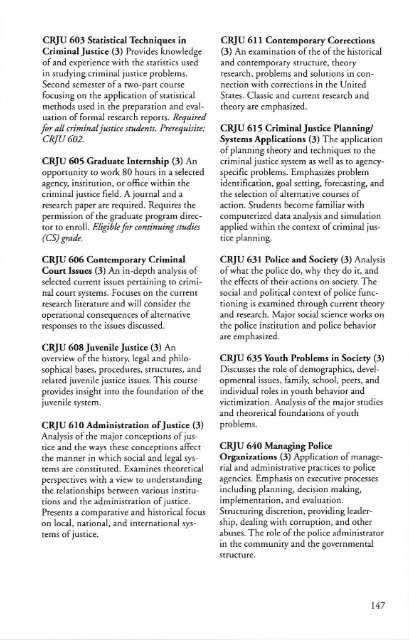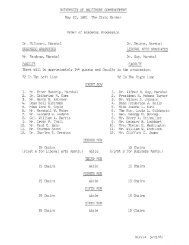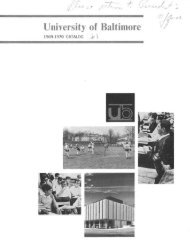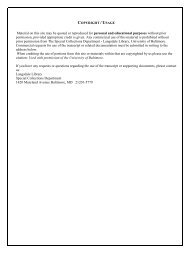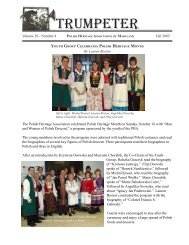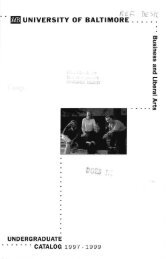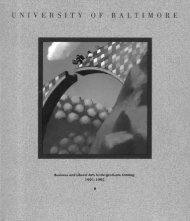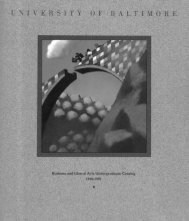2003-2005 - Special Collections - University of Baltimore
2003-2005 - Special Collections - University of Baltimore
2003-2005 - Special Collections - University of Baltimore
Create successful ePaper yourself
Turn your PDF publications into a flip-book with our unique Google optimized e-Paper software.
CRJU 603 Statistical Techniques in<br />
Criminal Justice (3) Provides knowledge<br />
<strong>of</strong> and experience with the statistics used<br />
in studying criminal justice problems.<br />
Second semester <strong>of</strong> a rwo-parr course<br />
focusing on the application <strong>of</strong> statistical<br />
methods used in the preparation and evaluation<br />
<strong>of</strong> formal research reports. Required<br />
for all criminal justice students. Prerequisite:<br />
CRjU602.<br />
CRJU 605 Graduate Internship (3) An<br />
opportunity to work 80 hours in a selected<br />
agency, institution, or <strong>of</strong>fice within the<br />
criminal justice field. A journal and a<br />
research paper are required. Requires the<br />
permission <strong>of</strong> the graduate program director<br />
to enroll. Eligible for continuing studies<br />
(CS) grade.<br />
CRJU 606 Contemporary Criminal<br />
Court Issues (3) An in-depth analysis <strong>of</strong><br />
selected current issues pertaining to criminal<br />
court systems. Focuses on the current<br />
research literature and will consider the<br />
operational consequences <strong>of</strong> alternative<br />
responses to the issues discussed.<br />
CRJU 608 Juvenile Justice (3) An<br />
overview <strong>of</strong> the history, legal and philosophical<br />
bases, procedures, structures, and<br />
related juvenile justice issues. This course<br />
provides insight into the foundation <strong>of</strong> the<br />
juvenile system.<br />
CRJU 610 Administration <strong>of</strong>Justice (3)<br />
Analysis <strong>of</strong> the major conceptions <strong>of</strong> justice<br />
and the ways these conceptions affect<br />
the manner in which social and legal systems<br />
are constituted. Examines theoretical<br />
perspectives with a view to understanding<br />
the relationships berween various institutions<br />
and the administration <strong>of</strong>justice.<br />
Presents a comparative and historical focus<br />
on local, national, and international systems<br />
<strong>of</strong> justice.<br />
CRJU 611 Contemporary Corrections<br />
(3) An examination <strong>of</strong> the <strong>of</strong> the historical<br />
and contemporary structure, theory<br />
research, problems and solutions in connection<br />
with corrections in the United<br />
States. Classic and current research and<br />
theory are emphasized.<br />
CRJU 615 Criminal Justice Planning/<br />
Systems Applications (3) The application<br />
<strong>of</strong> planning theory and techniques to the<br />
criminal justice system as well as to agencyspecific<br />
problems. Emphasizes problem<br />
identification, goal setting, forecasting, and<br />
the selection <strong>of</strong> alternative courses <strong>of</strong><br />
action. Students become familiar with<br />
computerized data analysis and simulation<br />
applied within the context <strong>of</strong>criminal justice<br />
planning.<br />
CRJU 631 Police and Society (3) Analysis<br />
<strong>of</strong> what the police do, why they do it, and<br />
the effects <strong>of</strong> their actions on society. The<br />
social and political context <strong>of</strong> police functioning<br />
is examined through current theory<br />
and research. Major social science works on<br />
the police institution and police behavior<br />
are emphasized.<br />
CRJU 635 Youth Problems in Society (3)<br />
Discusses the role <strong>of</strong> demographics, developmental<br />
issues, family, school, peers, and<br />
individual roles in youth behavior and<br />
victimization. Analysis <strong>of</strong> the major studies<br />
and theoretical foundations <strong>of</strong> youth<br />
problems.<br />
CRJU 640 Managing Police<br />
Organizations (3) Application <strong>of</strong> managerial<br />
and administrative practices to police<br />
agencies. Emphasis on executive processes<br />
including planning, decision making,<br />
implementation, and evaluation.<br />
Structuring discretion, providing leadership,<br />
dealing with corruption, and other<br />
abuses. The role <strong>of</strong> the police administrator<br />
in the community and the governmental<br />
structure.<br />
147


